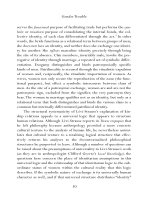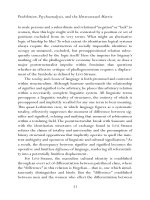GENDER TROUBLE 15
Bạn đang xem bản rút gọn của tài liệu. Xem và tải ngay bản đầy đủ của tài liệu tại đây (20.57 KB, 1 trang )
Gender Trouble
perspective: if what is meant by this distinction is that heterosexual
normativity ought not to order gender, and that such ordering ought to
be opposed, I am firmly in favor of this view.4 If, however, what is
meant by this is that (descriptively speaking), there is no sexual regulation of gender, then I think an important, but not exclusive, dimension
of how homophobia works is going unrecognized by those who are
clearly most eager to combat it. It is important for me to concede,
however, that the performance of gender subversion can indicate nothing about sexuality or sexual practice. Gender can be rendered
ambiguous without disturbing or reorienting normative sexuality at
all. Sometimes gender ambiguity can operate precisely to contain or
deflect non-normative sexual practice and thereby work to keep normative sexuality intact.5 Thus, no correlation can be drawn, for
instance, between drag or transgender and sexual practice, and the distribution of hetero-, bi-, and homo-inclinations cannot be predictably
mapped onto the travels of gender bending or changing.
Much of my work in recent years has been devoted to clarifying
and revising the theory of performativity that is outlined in Gender
Trouble.6 It is difficult to say precisely what performativity is not only
because my own views on what “performativity” might mean have
changed over time, most often in response to excellent criticisms,7 but
because so many others have taken it up and given it their own formulations. I originally took my clue on how to read the performativity of
gender from Jacques Derrida’s reading of Kafka’s “Before the Law.”
There the one who waits for the law, sits before the door of the law,
attributes a certain force to the law for which one waits.The anticipation of an authoritative disclosure of meaning is the means by which
that authority is attributed and installed: the anticipation conjures its
object. I wondered whether we do not labor under a similar expectation concerning gender, that it operates as an interior essence that
might be disclosed, an expectation that ends up producing the very
phenomenon that it anticipates. In the first instance, then, the performativity of gender revolves around this metalepsis, the way in which
xiv









